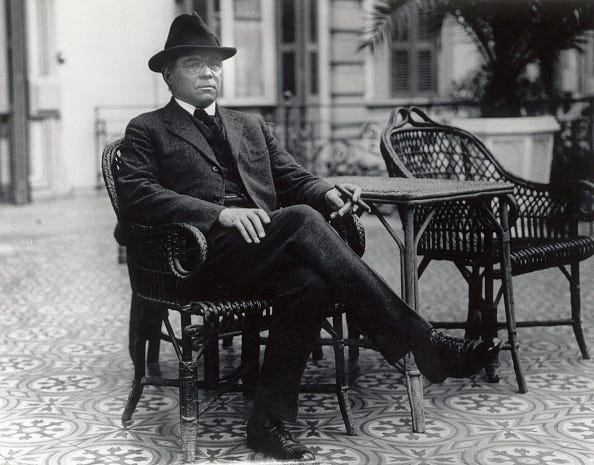The Writer's Almanac from Friday, August 23, 2013
"Talking in Bed" by Philip Larkin, from Collected Poems. © Farrar, Straus and Giroux, 2003.
ORIGINAL TEXT AND AUDIO - 2013
On this day in 1927 Nicola Sacco, a shoemaker, and Bartolomeo Vanzetti, a fish seller, were executed in Boston. The two men, Italian immigrants, had been convicted of the murders of Frederick Parmenter and Alessandro Berardelli, employees of the Slater & Morrill Shoe Company. Seven years earlier, April 15, 1920 at 3:00 in the afternoon, in the broad daylight of South Braintree, Massachusetts, two thieves shot and robbed a paymaster and his guard of the nearly $16,000 payroll they were carrying.
Seven shots were fired. The killers picked up the two boxes containing the money, leaped into a car containing several other men, and sped away. The whole event took less than a minute.
A few weeks later, Sacco and Vanzetti were arrested on a streetcar by a policeman who thought they looked suspicious. Both men were armed, and they lied to police about their guns. That September, Sacco and Vanzetti were indicted for the murders. The trial began the following spring in Dedham, Massachusetts. The case was heard by Judge Webster Thayer, who called the two men "anarchists." On the evening of July 14, the jury returned its verdict: both men were declared guilty of murder in the first degree.
Neither Sacco nor Vanzetti had a criminal record, nor were they communists. But they were known to the authorities as militant radicals. They were politically active and had been involved in the anti-war movement. Their arrest took place just after the Red Scare of 1919, a time of fear and political unrest.
Though Sacco and Vanzetti believed themselves to be victims of prejudice, Judge Thayer denied all motions for a new trial. Vanzetti said in his last speech to Judge Thayer: "My conviction is that I have suffered for things that I am guilty of. I am suffering because I am a radical, and indeed I am a radical; I have suffered because I was an Italian, and indeed I am an Italian ..."
Many well-known artists and intellectuals — including H.G. Wells, Upton Sinclair, Edna St. Vincent Millay, Bertrand Russell, Dorothy Parker, John Dos Passos, and George Bernard Shaw — demanded and campaigned for a retrial. They were unsuccessful. On August 23, 1927, seven years after their arrest, Sacco and Vanzetti were sent to the electric chair. The execution caused riots in Germany, Paris, and London.
On this date in 1305, William Wallace was executed for treason in London. Wallace was a Scottish national hero. He'd fought unsuccessfully against the English for Scottish independence. In the 14th century, a convicted traitor was typically "hanged, drawn, and quartered": first he was dragged behind a horse to the execution site, which was often some miles away. Then he was hanged until he was nearly dead, at which point he was cut down and disemboweled; his entrails were often burned in front of him. At this point, he might be beheaded, and the final step — quartering — involved tying each of his limbs to four separate horses, which were then spurred to run in opposite directions.
A history book called The History of English Law Before the Time of Edward I (1898) reports that Wallace was drawn — that is, dragged behind a horse — for treason, hanged for robbery and homicide, disemboweled for sacrilege, beheaded for outlawry, and quartered for "various depredations."
And it's the birthday of Edgar Lee Masters, born in Garnett, Kansas (1868). He grew up in small farming towns in Illinois, and he wanted to write a novel about growing up in Illinois, but he didn't know where to start. Then, the editor of a poetry magazine sent him a book of poems called Selected Epigrams from the Greek Anthology, epigrams from classical Greece, many of them about the details of daily life and ordinary people. So Masters took that idea, and he wrote Spoon River Anthology (1915), in which residents of a small Illinois town called Spoon River speak from beyond the grave and tell their life stories, more than 200 characters in all. The same editor who had sent Masters the book of epigrams serialized the poems from Spoon River in his journal, and then they were published as a book. It became a huge success, going through 70 printings. It changed the way Americans thought about small towns, which had been considered merely innocent or boring places. American writers had focused almost exclusively on big cities. But Edgar Lee Masters turned small towns into places of intrigue, and American writers have been exploring the closets and bedrooms of small towns ever since.
The people in Masters's hometown were angry for decades about the slanderous things Masters had written about their citizens. It took more than 50 years before the town where Masters went to high school stocked Spoon River Anthology in its library.
Be well, do good work, and keep in touch.®
Garrison Keillor will be out on the road this fall! For a complete schedule with details, CLICK HERE!






"his entrails were often burned in front of him" !? How's that?